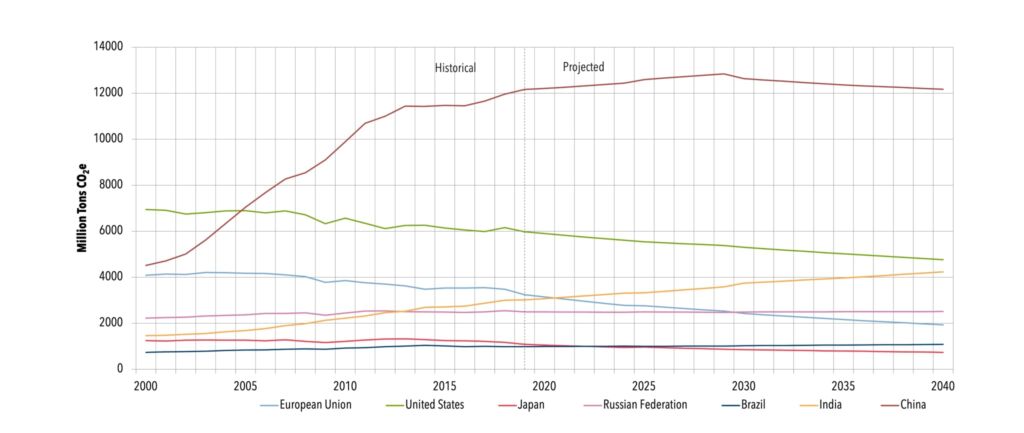Developing countries won’t ‘follow our lead’ after seeing Europe’s energy disaster
It is generally agreed, even by the greenest among us, that efforts to fight ‘climate change’ by ending the use of fossil fuels in the West will be a fair waste of time if those in the developing world — China, India, Africa — don’t do so as well.
According to the Environmental Protection Agency, China and India were responsible for 37 percent of global greenhouse gas emissions in 2014. In 2015, as Figure 1 shows, the Center for Global Development found that developing countries are responsible for 63 percent of current carbon emissions worldwide. And, while developed countries such as the United States, Canada, the United Kingdom and members of the European Union have committed to reducing their emissions of greenhouse gases, as Figure 2 shows, emissions from both China and India are forecast to rise for a while yet.
Figure 1:

Source: Center for Global Development
Figure 2: Greenhouse Gas Emissions for Major Economies, 1990–2040

Source: Center for Climate and Energy Solutions
A common argument in favor of these emissions reductions in developed countries is that, while they may do very little in themselves to stave off the damage wrought by ‘climate change,’ they can set an example to other nations, such as China and India: the West will be ‘taking a lead,’ so to speak. But the developing world might be somewhat reluctant to follow our lead if it leads to chaos like that which Europe is currently experiencing.
As my colleague Isaac Orr noted yesterday, energy prices are rocketing across Europe. As Bloomberg reports:
Even with mild weather in September, gas and electricity prices were breaking records across the continent and in the U.K. Italy’s Ecological Transition Minister Roberto Cingolani said he expected power prices to increase by 40% in the third quarter. In the U.K., CF Industries Holdings Inc., a major fertilizer producer, shut two plants, and Norwegian ammonia manufacturer Yara International ASA curbed its European production because of high fuel costs, as the crunch started to hit industrial companies.
Why is this happening? Anna Shiryaevskaya, Rachel Morison and Isis Almeida explain:
The unprecedented energy crunch has been brewing for years, with Europe growing increasingly dependent on intermittent sources of energy such as wind and solar while investments in fossil fuels declined. Environmental policy has also pushed some countries to shut their coal and nuclear fleets, reducing the number of power plants that could serve as back-up in times of shortages.
The consequences of this self-inflicted energy shortage could well be calamitous:
Europe will need to curtail demand if the winter is cold, Goldman Sachs Group Inc. said, predicting the region will face blackouts. There are already signs of stress, with CF Industries Holdings Inc. shutting two fertilizer plants in the U.K. and Yara International ASA will have curtailed its ammonia production capacity by 40% by next week.
Shutdowns also risk hitting the food supply chain, which uses a byproduct of fertilizer production in everything from meat processing to beer. The sugar and starch industries are also affected, with France’s Tereos SCA and Roquette Freres SA warning of higher energy costs.
And it doesn’t stop there. Europe top copper producer Aurubis AG said higher prices will continue to squeeze margins through the rest of the year. Even chemicals giant BASF SE, which produces most of its power, said it has been unable to fully swerve the impact of record-breaking electricity prices.
So this is what ‘taking the lead’ looks like: Blackouts and disruption to food production and industry.
Do you really think that the Chinese, Indians and others in the developing world are going to look at this self-made mess and think, ‘We need to follow their lead’? Or do you think they are going to be scratching their heads, wondering how people can do this to themselves?
The heavy costs of reductions in greenhouse gas emissions in the developed countries aren’t going to bring benefits unless developing countries follow suit. It looks like even that hope will prove forlorn.